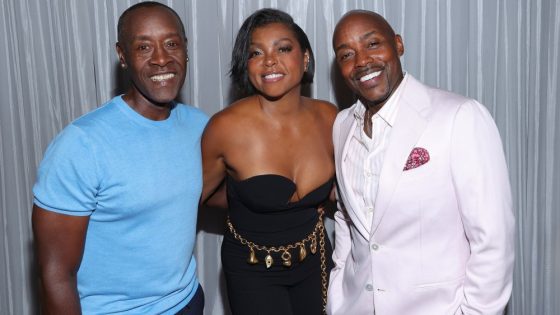In late October 1970, Muhammad Ali returned to the boxing ring after being suspended from the sport three years prior for his refusal to be drafted in the Vietnam War. Though the legendary boxer won the fight against opponent Jerry Quarry, the front pages of Atlanta’s newspapers the next day boasted a tale much more compelling than Ali’s comeback. Peacock’s forthcoming limited series, “Fight Night: The Million Dollar Heist,” based on the true-crime podcast, tells the story of the greatest robbery in Georgia’s history and how Atlanta transformed into the Black Mecca.
“I read the script, and I was like, whoa,” series star Taraji P. Henson told Variety during a sit-down conversation at the Martha’s Vineyard African American Film Festival (MVAAFF), where the series premiered ahead of its Sept. 5 debut on Peacock.
“I remember I had a good two friends move down there in the early nineties. I’m like, ‘What’s the big deal about Atlanta?’ Cut to I read the scripts, and I understand that’s still the residual of what Chicken Man started in 1970, and that blew my mind,” she said. “To find out that that’s where it stemmed from, it just was one of those great historical moments.”
“Fight Night” follows Chicken Man (Kevin Hart), an Atlanta hustler who throws a massive party following the fight with a guest list that includes some of the country’s most prominent gangsters. However, when the party results in a brazen heist, Chicken Man pleads with Detective J.D. Hudson (Don Cheadle), the Atlanta police force’s sole Black detective, to help clear his name.
While Cheadle was thrilled to work with Henson again (following 2007’s “Talk to Me”), along with co-stars Hart, Samuel L. Jackson and Terrence Howard, he was also intrigued with Hudson — who, due to his profession, was ostracized from his own community.
“Shaye [Ogbonna’s] script was very clearly laid out, so that was the blueprint. Then just filling it out with the research and who [J.D] was and getting clear on trying to figure out the tone for the piece,” Cheadle says. “That was my way in. It’s like, ‘Who is this guy for real?’ Luckily we have a lot of interviews with him, and could look at tape and talk to people who knew him. It was just fun to try getting his skin.”
Though the series narrative is compelling on its own, the unique characters make “Fight Night” a truly distinct tale. Henson portrays Vivian Thomas, who is Chicken Man’s partner in every sense of the word. She’s also unlike any character Henson has played in her career.
“I just love women who understand and are clear on what they want out of life,” Henson says. “I love characters that are unapologetically them. That’s a bold place to exist in, and my hope is that more people will start living like that. I’m always interested in characters like that because they give you hope.”
As fun and fantastical as “Fight Night” is, unearthing this story reveals how much Black history has been buried and forgotten.
“The fact that it happened and that we don’t really know about it is what surprised me,” Cheadle says. “When you listen to the podcast, they talk about why it was buried, and then you think about who it involved, and you’re like, ‘Of course, nobody’s going to know about it. It’s not happening in Beverly Hills; it’s not happening in Buckhead. It’s happening over there.’ A lot of our stories, if we unearth them, will be fascinating and amazing and unbelievable. Who knew that it might be actors and artists who have to make sure that history is told.”
Unearthing the texture of the series was extremely important to creator Shaye Ogbonna and executive producer Will Packer. The duo took great pains to scout locations in Atlanta that have remained untouched since 1970. A replica of the 1966 Cadillac Calais that Chicken Man drives in the series (which was restored by West Coast Customs) was on-site during “Fight Night’s” MVAAFF premiere. Moreover, costume designer James “Jimmy” Hawkins ensured that the actors wardrobes aided in their storytelling.
The same was true when they made “Talk to Me,” Henson recalls. “We were in the trailer, and [Don] was getting his wig and sideburns on, and she was covering up my tattoos. It was something about them putting those outfits on us — once he got his wig on and I had mine on, we got up and just started doing the Soul Train,” she says. “It’s all a part of the process. Sometimes, I don’t even understand who my character is until I have my costume.”
More than just a flashback in time to examine a distinct moment in Atlanta’s history, Cheadle and Henson hope that “Fight Night” breeds curiosity in audiences about what kind of stories are told and why.
“I hope people just have a great time,” Cheadle says. “Often the best thing we can do is smuggle things in and hopefully get people interested in their history. It’s like you just hope to spark people’s interest in a broader story, but I think the first job is to entertain.”
Henson adds, “I hope audiences take away how powerful we are when we move in numbers and how powerful our dollar is, because that’s what this series is about. Anywhere we move like that in numbers, when we take our money and invest, I just want people to see that that’s the type of power that we have in our own communities. Without asking for handouts.”
Source Agencies

